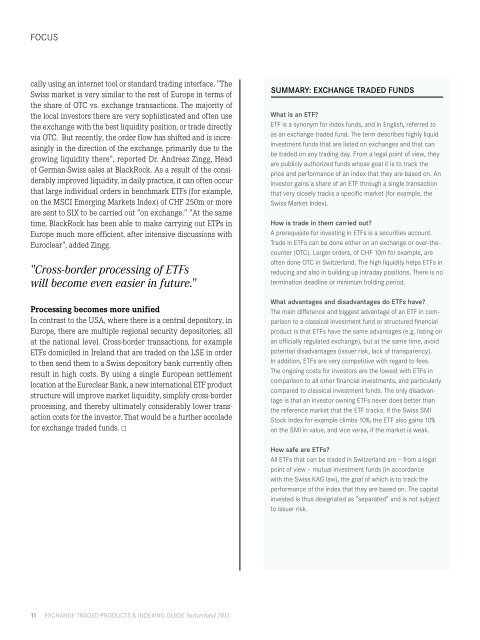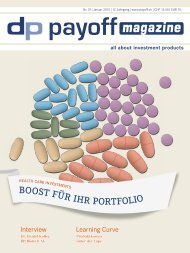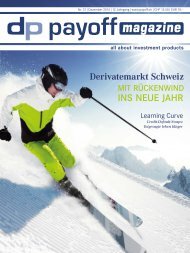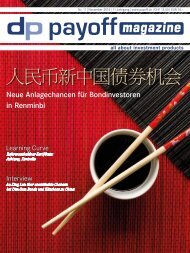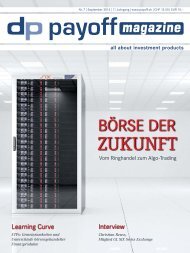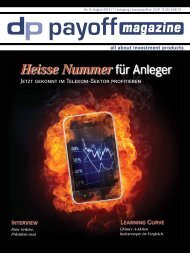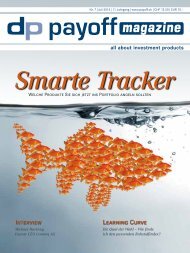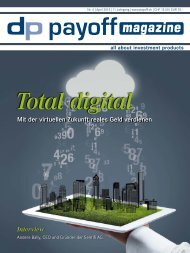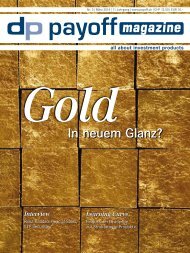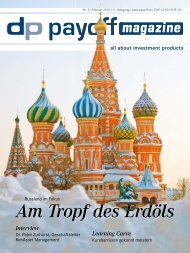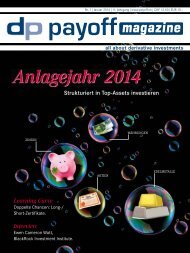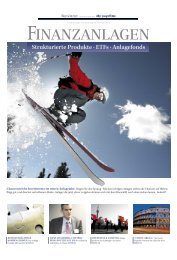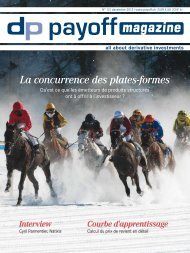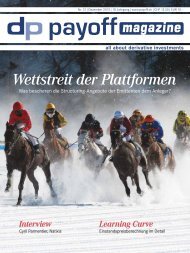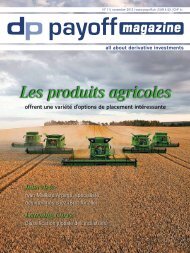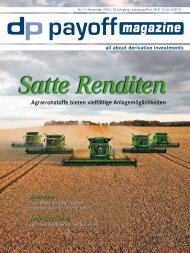Create successful ePaper yourself
Turn your PDF publications into a flip-book with our unique Google optimized e-Paper software.
Focus<br />
cally using an internet tool or standard trading interface. "The<br />
Swiss market is very similar to the rest of Europe in terms of<br />
the share of OTC vs. exchange transactions. The majority of<br />
the local investors there are very sophisticated and often use<br />
the exchange with the best liquidity position, or trade directly<br />
via OTC. But recently, the order flow has shifted and is increasingly<br />
in the direction of the exchange, primarily due to the<br />
growing liquidity there", reported Dr. Andreas Zingg, Head<br />
of German-Swiss sales at BlackRock. As a result of the considerably<br />
improved liquidity, in daily practice, it can often occur<br />
that large individual orders in benchmark ETFs (for example,<br />
on the MSCI Emerging Markets Index) of CHF 250m or more<br />
are sent to SIX to be carried out "on exchange." "At the same<br />
time, BlackRock has been able to make carrying out ETPs in<br />
Europe much more efficient, after intensive discussions with<br />
Euroclear", added Zingg.<br />
"Cross-border processing of ETFs<br />
will become even easier in future."<br />
Processing becomes more unified<br />
In contrast to the USA, where there is a central depository, in<br />
Europe, there are multiple regional security depositories, all<br />
at the national level. Cross-border transactions, for example<br />
ETFs domiciled in Ireland that are traded on the LSE in order<br />
to then send them to a Swiss depository bank currently often<br />
result in high costs. By using a single European settlement<br />
location at the Euroclear Bank, a new international ETF product<br />
structure will improve market liquidity, simplify cross-border<br />
processing, and thereby ultimately considerably lower transaction<br />
costs for the investor. That would be a further accolade<br />
for exchange traded funds. <br />
11 ExchangE TradEd ProducTs & IndExIng guIdE <strong>Switzerland</strong> <strong>2013</strong><br />
SuMMary: EXChangE tradEd fundS<br />
what is an Etf?<br />
ETF is a synonym for index funds, and in English, referred to<br />
as an exchange traded fund. The term describes highly liquid<br />
investment funds that are listed on exchanges and that can<br />
be traded on any trading day. From a legal point of view, they<br />
are publicly authorized funds whose goal it is to track the<br />
price and performance of an index that they are based on. an<br />
investor gains a share of an ETF through a single transaction<br />
that very closely tracks a specific market (for example, the<br />
swiss Market Index).<br />
how is trade in them carried out?<br />
a prerequisite for investing in ETFs is a securities account.<br />
Trade in ETFs can be done either on an exchange or over-thecounter<br />
(oTc). larger orders, of chF 10m for example, are<br />
often done oTc in switzerland. The high liquidity helps ETFs in<br />
reducing and also in building up intraday positions. There is no<br />
termination deadline or minimum holding period.<br />
what advantages and disadvantages do Etfs have?<br />
The main difference and biggest advantage of an ETF in comparison<br />
to a classical investment fund or structured financial<br />
product is that ETFs have the same advantages (e.g. listing on<br />
an officially regulated exchange), but at the same time, avoid<br />
potential disadvantages (issuer risk, lack of transparency).<br />
In addition, ETFs are very competitive with regard to fees.<br />
The ongoing costs for investors are the lowest with ETFs in<br />
comparison to all other financial investments, and particularly<br />
compared to classical investment funds. The only disadvantage<br />
is that an investor owning ETFs never does better than<br />
the reference market that the ETF tracks. If the swiss sMI<br />
stock Index for example climbs 10%, the ETF also gains 10%<br />
on the sMI in value, and vice versa, if the market is weak.<br />
how safe are Etfs?<br />
all ETFs that can be traded in switzerland are — from a legal<br />
point of view — mutual investment funds (in accordance<br />
with the swiss Kag law), the goal of which is to track the<br />
performance of the index that they are based on. The capital<br />
invested is thus designated as "separated" and is not subject<br />
to issuer risk.


